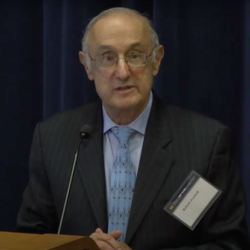Biography:Robert Axelrod
Robert Axelrod | |
|---|---|
 Axelrod in 2019 | |
| Born | Robert Marshall Axelrod May 27, 1943 Chicago , Illinois |
| Awards | Johan Skytte Prize (2013) National Medal of Science (2014) |
| Academic background | |
| Alma mater | |
| Thesis | Conflict of Interest: A Theory of Divergent Goals with Applications to Politics (1969) |
| Doctoral advisor | Hayward Alker |
| Academic work | |
| Discipline | Political science |
| Sub-discipline | Policy studies |
| Institutions | |
Robert Marshall Axelrod (born May 27, 1943) is an American political scientist. He is Professor of Political Science and Public Policy at the University of Michigan where he has been since 1974. He is best known for his interdisciplinary work on the evolution of cooperation. His current research interests include complexity theory (especially agent-based modeling), international security, and cyber security. His research includes innovative approaches to explaining conflict of interest, the emergence of norms, how game theory is used to study cooperation, and cross-disciplinary studies on evolutionary processes.[1]
Biography
Axelrod received his B.A. in mathematics from the University of Chicago in 1964. In 1969, he received his Ph.D. in political science from Yale University for a thesis entitled Conflict of interest: a theory of divergent goals with applications to politics. He taught at the University of California, Berkeley, from 1968 until 1974.
Among his honors and awards are membership in the National Academy of Sciences, a five-year MacArthur Prize Fellowship, the Newcomb Cleveland Prize of the American Association for the Advancement of Sciences for an outstanding contribution to science. He was elected a Fellow of the American Academy of Arts and Sciences in 1985.[2] In 1990 Axelrod was awarded the inaugural NAS Award for Behavioral Research Relevant to the Prevention of Nuclear War from the National Academy of Sciences.[3] He is also a faculty affiliate of the Science, Technology, and Public Policy (STPP Program) at the University of Michigan Gerald R. Ford School of Public Policy.[4]
Recently Axelrod has consulted and lectured on promoting cooperation and harnessing complexity for the United Nations, the World Bank, the U.S. Department of Defense, and various organizations serving health care professionals, business leaders, and K–12 educators.
Axelrod was the President of the American Political Science Association (APSA) for the 2006–2007 term. He focused his term on the theme of interdisciplinarity.
In May 2006, Axelrod was awarded an honorary degree by Georgetown University. In 2013, he was awarded the Johan Skytte Prize in Political Science. In 2014, President Barack Obama presented Axelrod with a National Medal of Science.[5] On May 28, 2015, he was awarded an honorary doctorate by Harvard University.[6]
Bibliography
Books
- Axelrod, Robert (1970). Conflict of interest: a theory of divergent goals with applications to politics. Markham Pub. Co.. ISBN 9780841030206. https://archive.org/details/conflictofintere00axel. Retrieved 28 April 2012.
- Axelrod, Robert (1976), Structure of Decision: The Cognitive Map of Political Elites, Princeton University Press, ISBN 978-0-691-10050-0
- Axelrod, Robert (1984), The Evolution of Cooperation, Basic Books, ISBN 978-0-465-02122-2
- Axelrod, Robert (1997), The Complexity of Cooperation: Agent-Based Models of Competition and Collaboration, Princeton University Press, ISBN 978-0-691-01567-5
- Axelrod, Robert (2006), The Evolution of Cooperation (Revised ed.), Perseus Books Group, ISBN 978-0-465-00564-2
- Axelrod, Robert; Cohen, Michael D. (2001-08-02). Harnessing Complexity. Basic Books. ISBN 978-0-465-00550-5. https://books.google.com/books?id=oB7heZWjwxkC. Retrieved 28 April 2012.
- Axelrod, Robert (2023), Passion for Cooperation: Adventures of a Wide-Ranging Scientist, University of Michigan Press, ISBN 9780472903948
Journal articles
- Axelrod, Robert; Hamilton, William D. (27 March 1981). "The evolution of cooperation". Science 211 (4489): 1390–1396. doi:10.1126/science.7466396. PMID 7466396. Bibcode: 1981Sci...211.1390A.
- Axelrod, Robert (April 1997). "The dissemination of culture: a model with local convergence and global polarization". Journal of Conflict Resolution 41 (2): 203–226. doi:10.1177/0022002797041002001.
- Axelrod, Robert; Atran, S, Davis, R (2007) Sacred Barriers to Conflict Resolution, Science (317)[7]
See also
- Cognitive map
- Evolutionarily stable strategy
- Prisoner's dilemma
References
- ↑ Glenn H. Utter, and Charles Lockhart, eds. American Political Scientists: A Dictionary (2nd ed. 2002) pp 11–14, online
- ↑ "Book of Members, 1780–2010: Chapter A". American Academy of Arts and Sciences. http://www.amacad.org/publications/BookofMembers/ChapterA.pdf.
- ↑ "NAS Award for Behavior Research Relevant to the Prevention of Nuclear War". National Academy of Sciences. http://www.nasonline.org/site/PageServer?pagename=AWARDS_behavioral_research.
- ↑ "Robert Axelrod | Science, Technology and Public Policy (STPP)". https://stpp.fordschool.umich.edu/tags/robert-axelrod.
- ↑ "Remarks by the President at National Medals of Science and National Medals of Technology and Innovation Award Ceremony". White House. http://m.whitehouse.gov/the-press-office/2014/11/20/remarks-president-national-medals-science-and-national-medals-technology.
- ↑ "Ten to receive honorary degrees". May 28, 2015. https://news.harvard.edu/gazette/story/2015/05/ten-to-receive-honorary-degrees/.
- ↑ Atran, Scott; Axelrod, Robert; Davis, Richard (2007-08-24). "Sacred Barriers to Conflict Resolution" (in en). Science 317 (5841): 1039–1040. doi:10.1126/science.1144241. ISSN 0036-8075. PMID 17717171.
